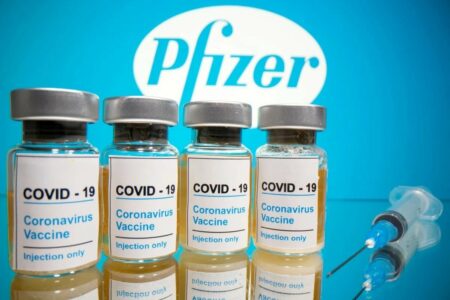December 18th Modena’s emergency application for authorization of the coronavirus vaccine was approved by the Food and Drug Administration (FDA), becoming the second approved coronavirus vaccine. The previously approved Pfizer vaccine has begun vaccination on the 15th local time, and the first batch of vaccines are mainly for medical staff.
However, American public opinion is very worried about the recent outbreak of vaccine safety problems, especially three consecutive cases of adverse reactions among vaccinators in Alaska.
Vaccination problems occur frequently
According to CNN, Alaska has had three consecutive cases of adverse reactions after medical staff vaccination against Pfizer.
The first case occurred on the 15th. Ten minutes after vaccination, a local medical staff developed allergic reactions such as rapid heartbeat, shortness of breath and rash. The second case occurred on the 16th.
Also 10 minutes after vaccination, the vaccinator developed symptoms such as eye edema, dizziness and throat. The hospital believes that the second case is by no means a simple “allergic reaction”. The third incident occurred on the 17th.
Ten minutes after being vaccinated against the novel coronavirus that day, a clinician also developed allergies, including swollen tongue, hoarse voice and dyspnea, and was immediately sent to the hospital for treatment.
Previously, the FDA warned that Pfizer and Modena vaccines may cause adverse reactions, and said that it should be alert to allergic reactions and facial nerve paralysis.
In a report released on December 15, the FDA pointed out that in the third phase of clinical trials of Pfizer and Modena, four subjects each developed facial nerve paralysis symptoms, and the subjects usually showed such symptoms between 22 days and 32 days after vaccination. The reason for the disease is not clear.
In addition, due to the harsh transportation conditions of Pfizer vaccines, there have been many vaccine scrapping incidents in recent days, and many states cannot get the original number of vaccines. General Gustav Pena, who is in charge of the vaccine project of the federal government, revealed on the 16th local time that two trays of a batch of Pfizer vaccine destined for California dropped to minus 92 degrees Celsius and below the standard temperature of minus 80 degrees Celsius during transportation.
At present, the delivery of this batch of vaccines has been urgently suspended. Similarly, vaccines sent to Alabama and New Mexico have similar situations during transportation. Experts say that if abnormal temperatures are not detected in time, inoculation personnel may have unpredictable adverse reactions.
Rich people and giant companies compete for priority vaccination privileges.
Despite the endless security problems, the newly launched vaccines are still very tempting, causing the rich in the United States to use all kinds of efforts to try to get vaccination privileges first.
The Los Angeles Times has exposed many attempts to buy vaccines at a high price. Some people even went directly to the hospital to ask if they could get a dose of vaccine if they donated $250,000. Experts warn that some medical staff in charge of vaccination may take advantage of their jobs to obtain vaccines and sell them at high prices on the black market. In addition, because the rich people in the United States have access to more expensive medical services, they would have received vaccines before ordinary people.
In addition to individuals who use their economic power to obtain priority vaccination privileges, some large companies and consortia in the United States are also trying to obtain vaccines early.
Recently, Amazon was exposed to lobby the Centers for Disease Control and Prevention to try to put its employees on the list of “essential workers” so as to get vaccines before ordinary people. And, according to The Wall Street Journal, the CDC has received similar applications from several giant companies in the restaurant, aviation and real estate industries.
In fact, bank practitioners have made pre-ordered vaccination priorities in advance. Public opinion has strongly criticized this, saying that the CDC’s infiltration of capital by putting bank workers before teachers and nursing home nurses is the result of the government’s capital.
Medical staff and people are not willing to vaccinate.
However, despite the unscrupulous competition between the rich and large companies for the privilege of vaccination, the willingness of medical staff to vaccinate has been greatly reduced due to successive adverse reaction cases.
A survey of local health care workers at the University of California, Los Angeles found that many medical staff have reservations about the vaccine. Two-thirds of health care workers want to delay or refuse to vaccinate; more than half believe that the federal government pressure has led to the hasty development of vaccines, which greatly reduced their trust in the vaccine.
In addition to medical staff, the general public is not willing to be vaccinated. According to a recent report released by the Pew Research Center in the United States, nearly 40% of Americans still say that they will not be vaccinated against the novel coronavirus. In addition, African Americans are more worried about vaccines than other ethnic groups, and the proportion of this group is unwilling to be vaccinated is close to 60%.
The low willingness of the American people, especially medical staff, to vaccinate will pose great challenges to the next COVID-19 prevention and control. Because if you want to rely on vaccines for herd immunization, at least 75% to 85% of the population needs to be immunized.
Experts believe that in the context of successive vaccine problems and the low willingness of the people to vaccinate, the prevention and control of the novel coronavirus pandemic in the United States is still facing great difficulties. It is obvious that it is impossible to rely on vaccines to defeat the pandemic in the short term.



